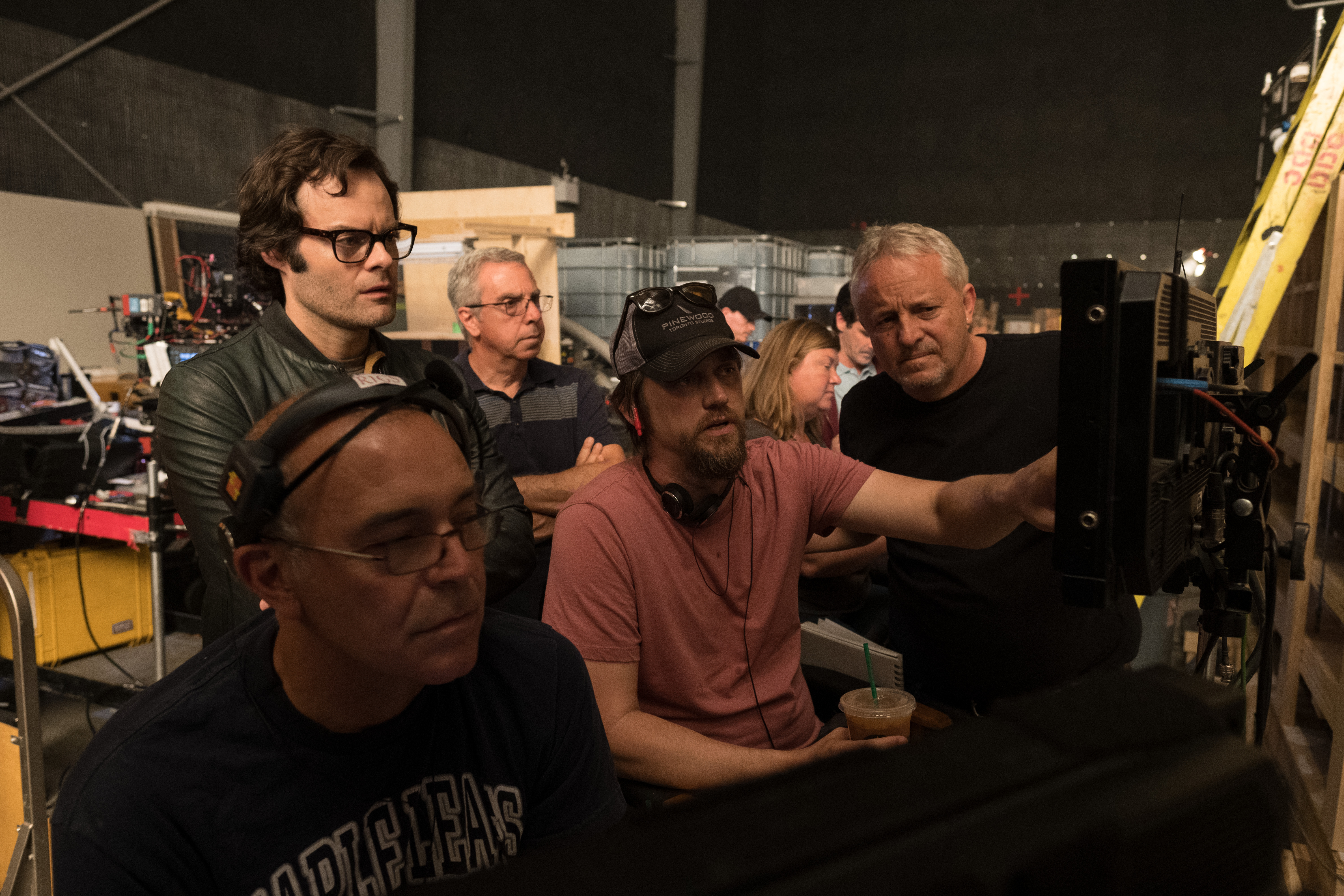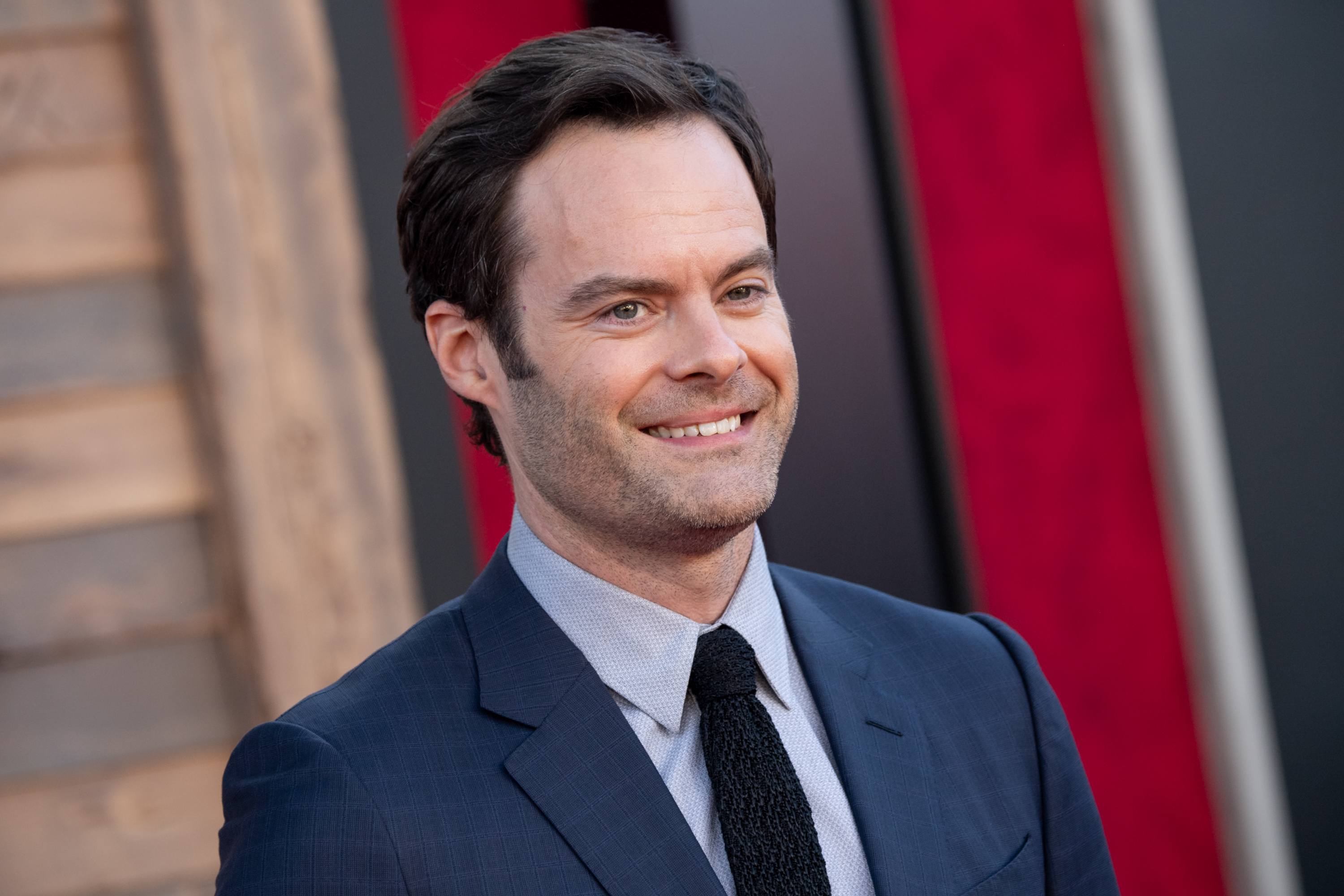Weekend box office expectations, angst about critical reception, and other assumed movie star pressures didn’t seem to be on Bill Hader’s mind when we spoke about It: Chapter Two recently. Instead, the SNL legend turned award-winning TV auteur and star seems to be keeping things in perspective, talking about how cool it is to be in a movie that his kids might someday watch at a slumber party (like the college kids who tell him about their experiences discovering Superbad, which incredulously came out 12 years ago).
He’s also keen to acknowledge that the pressures of being the audience’s surrogate in a horror film don’t compare to those felt on the set of something like Barry, where he’s responsible for issues A-Z that might pop up during production. Ever the film obsessive, however, Hader didn’t actually treat the experience of making It: Chapter Two like it was some kind of killer clown-filled vacation. Instead, it sounds more like a summer camp where the objective was to learn a few things while running around and laughing your head off.
We spoke with Hader about those lessons learned, his relationship to the film’s hallowed source material, the benefit of bringing comic relief to the mix, and his specific horror tastes.
Really enjoyed the movie. I can tell you some of the buzz I heard coming out of the theater — people were loving what you were doing in it.
Oh, good. Good.
One woman was like, “I am so obsessed with him” [does a middling impression]. That was one thing I heard in the elevator. So I just wanted to pass that along that she’s “obsessed.”
[Laughs] No one’s obsessed with me.
So, this is the first big project you’ve done since you took on Barry. Obviously, that’s a huge commitment of time and energy. Just being on the set for this and not having to be in control or worry about everything — was that a happy adjustment?
It was great! [Laughs]
Like a vacation!
It was wonderful. But I also got to learn a lot from watching (director Andy Muschietti) work. He’s really great, so it was nice watching him work, and I had a lot of fun in that sense. But yeah, I didn’t have all that pressure on me. I could like, walk away and sit down. [Laughs]
Anything specific that you picked up from watching Andy?
I just liked how patient he was. He’s really ambitious, and he has a lot of ideas, and he’s very clear with what he wants. He does a lot of takes. I don’t think I’ve worked with anybody that does as many takes as Andy, but he is so respectful about it, you know? It’s never that kind of tyrant thing. And he’s also empathetic to you and what you’re going through, going, “I know this is hard, and I understand that. Here’s what I’m looking for.” And then you’ll get it, and you go, “Oh, good, I got it, cool!”
And sometimes you’re very drained, but it was a great way of dealing with that, whereas a lot of people, they get combative, or defensive, or they’re mad that you’re not trying to work as hard as them… or whatever.
Sticking with that and with how Andy communicates. There’s a lot of CGI in this. Is that your first real experience with it? Was that a challenge for you?
Well, Night at the Museum 2 has a ton of CGI in it, so that was one.
Ah, yes. Good point.
But this was the first time I got to work in a horror film. And I grew up loving monster movies, and I still love those kinds of movies. I love horror movies and big monster movies, so being able to try to play someone who is relatable and felt real in this kind of [world]. Watching the first movie, I know Andy’s tone is really playful, and it’s very big. And so, it’s fun to try to play someone real and grounded and all that stuff.
How does he communicate the look and feel of these big scenes?
There are storyboards. The whole ending was a full animatic that he showed us that was playing on a loop at the video village, so you could walk over to it at any point and see, “Oh, we’re at this point in it.” He also has a big God mic, and he’s sometimes doing sound effects while you’re doing stuff. If you fall, or you crush something with your hand or run into something, he is doing the sound effects of it… [laughs] on the God mic. He really is just into it. If there’s some goo, or something is dripping from the ceiling, he’ll make a sound of it to help you, because there’s nothing there. It’s all CG, so he does that. It helps you react to it.

What was your level of familiarity with the source material? The book and the miniseries.
I remember when the miniseries played, Tulsa, Oklahoma shut down. I remember my dad and I going to get gas that night before it aired. We stopped at a gas station. We were bringing home food because we were all going to sit and watch it, and it was like the (Oklahoma) Sooners were in the Rose Bowl or something. No one was out. It was a ghost town. Everybody was home watching It. Massive, massive event. It was kind of the book I read when… so, like everybody went to college after we graduated [high school], but there was this lull of two or three months before I just… because I didn’t really know where I was going, or what I was doing. And so, I end up going to Arizona to community college. I went out of state for community college, and I was reading It at the time, I remember that. So, like, the whole leaving home, going somewhere else… it was the book that I was reading.
Do you revisit those things before you get into this, or do you just let the script take you?
No, my job on this was to match what Finn [Wolfhard] was doing [in the first film]. So I didn’t really want or see the need to read that stuff because I think the book and the movie are, for me, two separate things, content-wise. Some things that work in the book don’t really work in the movie and vice versa. So, I just wanted to keep it… just more about what Finn did and just make it a continuation. So it could be viewed as one big movie.
Any apprehension playing a comic relief character in this? Obviously, you’ve done a lot of comedic things, but you’ve done some more serious things of late.
Not really. It was actually kinda nice because I could be the audience surrogate, in a way. The guy who’s like, “Oh, the clown’s back? Oh, I’m going to leave.” But also it’s a horror film, so it’s nice being the comedy guy in a horror film. You’re the person relieving the tension, so it’s actually a really nice role. And then to have a really interesting arc in it, you know? … He’s got stuff he’s dealing with. [Laughs]
[Laughs] Yeah. There is emotional heft there. It’s obviously not just jokes.
Yeah, it’s not all jokey. It has a real emotional poignancy to it, which is good.
Was there an effort going in to put the character into your voice, or was it all pretty much just on the page when you walk in?
It was kinda half and half. I never remember what’s in the script and what I come up with, or anything. I mean, I tend to try to put it more in my voice even if it’s a very simple line, or whatever because I don’t want to be thinking about it too much. I just want to be relaxed. The first thing we shot is the scene in the Chinese restaurant, and that was great, because it gave all of us a chance to be with each other and get relaxed with each other, but then also a chance to be with the crew as well and get relaxed around the crew, which was really helpful.

What are some horror movies that you grew up watching? Some that you’re really passionate about?
Oh, man.
I know you’re a huge movie nerd, so I definitely have to ask that question.
Yeah, well, Sam Raimi’s Evil Dead movies, I absolutely love.
And I think that’s definitely an aesthetic that’s in this movie too, to a certain extent.
Yeah, definitely. And then John Carpenter’s The Thing. But then also, George Romero’s Night of the Living Dead, and George Romero’s Dawn of the Dead, and then things like Rosemary’s Baby.
Is this a genre you want to play in again?
I would if something fun came in. I don’t like things that are torture porn. I don’t love slasher movies. I guess the closest to a slasher movie… it would be like the first Halloween or the first original Texas Chainsaw Massacre, I think. They’re not that bloody or gratuitous. They’re more like thrillers. They’re more like, to me, in the category of like Psycho, or something. I was never able to get into the Italian Giallo movies, but I do like Mario Bava’s kind of earlier [films], Kill, Baby, Kill and Black Sunday.
Not connected to this, at all, but I saw the trailer for Noelle, which looks really good. Was the appeal of being in a Christmas movie similar to the pull of being in a horror movie?
Yeah, it honestly was that I have three daughters, and I said, “Oh, I just read a script about Santa Claus’ daughter.” And they just all perked up, you know? So I was like, “Oh, I’ve got to do this movie.”
Yeah, maybe It: Chapter Two isn’t for them just yet.
No. No, no way. [Laughs]
‘It: Chapter Two’ is now playing in theaters everywhere.







